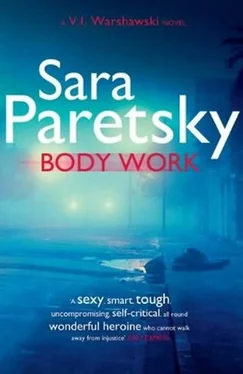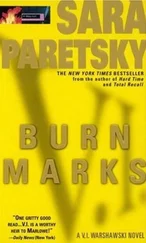The office phone had continued to ring while we talked. Now my cell phone chirped out a few bars of Mozart, my signal that one of a handful of key callers wanted me. I looked at the screen: my answering service was texting me that the cops, the media, and my clients were all getting restless over my inaccessibility.
“What is it you want from me, Mr. Vishneski?” I tried to mask my impatience.
“I want to know what really happened. I-my boy, he came back from I-raq in a bad way, I’ll be the first to admit that. He bounced off the walls, you couldn’t talk to him without getting your head bit off. He ran around with his Army buddies, got drunk, got in fights, couldn’t hang on to a job. But it’s hard for me to see him shooting a helpless young lady like that. I just don’t believe it. The cops, they’re happy to write ‘Case Closed’ on their file. And that public defender the county gave Chad… If he can remember Chad’s name when he gets into court, I’ll be surprised.”
“If he’s guilty, I can’t prove he’s innocent, Mr. Vishneski,” I said quietly.
“I wouldn’t want you to. But I need to know-What is it they always say on those law-and-order shows? ‘Beyond a reasonable doubt.’” He smiled, a painful crack in his lined face.
“What about the gun? The news reports say the cops found the murder weapon next to Chad when they went to arrest him.”
“It’s not his, I’m sure it’s not. Maybe he found it in the street and picked it up.”
I didn’t even try to respond to that parental fantasy. I rubbed my eyes with the heels of my hands, and Nadia’s face appeared behind my lids. Death chasing away anger, catching her by surprise.
“You said you weren’t sure you could afford bail for Chad, Mr. Vishneski, but I can’t take on a case like this pro bono.”
“I’m not asking you to. I’ve been running the numbers every which way all weekend. I’m still working three-quarter time, job-sharing with some other guys at Mercurio, although who knows how long that will last. Sorry, getting sidetracked. Mona’s getting into town tonight. I’ll talk to her. But if she agrees-she’s retired, took early retirement last year, was an office manager with Mercurio, one of their buildings-anyway, I think we can afford to hire a detective and still have something for a good defense lawyer, if we’re careful. If you can work without running up the bills on us. If you can recommend a good lawyer who’ll give us a bit of a break.”
After we’d signed a contract and Vishneski left for work, I did a background check on him just to see if he really could pay his bills. He was, indeed, on Mercurio’s payroll, and his credit history had no more hiccups than any other person who’d lived as long as he had. For the present, he could pay my bill and maybe that of my own defense lawyer, Freeman Carter.
I put away Vishneski’s file and started returning the phone calls that had come in during our meeting. It wasn’t until the end of the afternoon that I had time to get back to Chad Vishneski’s problems.
John Vishneski wanted to believe Chad was innocent, but he had confirmed the picture of a young man whose anger was close to the surface at all times. “He never was like that as a boy. He had such a happy disposition, even after Mona and I split up. We got two places, Mona and me, sold the house and got two condos pretty near each other so the boy could be both places and not feel he was in the middle of our problems. He always had a bunch of friends, boys, girls, always in and out of both apartments, all having fun. Clean fun. No drugs, no drunks. Mona and I set the same rules.”
According to Vishneski, Iraq had changed Chad’s personality. Jekyll and Hyde and which was the mean one? He could never remember. As he talked, Vishneski finally pulled a cigarette from his breast pocket. He played with it, tapping it on the tabletop, running it between his fingers, a prop to help him get through his story.
“He didn’t tell me he was joining up. I knew he wasn’t one for the books, but he just wandered into an Army recruitment office on Addison Street during spring break. Next thing I knew, he was off to basic training.”
“That must have startled you,” I said.
“I was pissed off, him doing it without even talking to me, throwing away his college scholarship. But then I saw how much the Army suited him, and I thought, well, maybe he knew best after all, he needed that discipline. That and the activity. He used to send us these pictures of him and his unit, they’d be laughing, Chad teaching Iraqi boys how to play American football. ‘That soccer, that’s for sissies,’ he says he told them.”
Vishneski rubbed his face. I wasn’t supposed to see the unexpected spurt of tears as he thought of his son’s happy-go-lucky past.
“But those endless deployments, they put the big hurt on all the kids out there. And they saw stuff no person ought to have to see, grown women fighting over a piece of bread, babies with their arms blown off, other things Chad wouldn’t even talk about. It was too much for him.”
I went back to the murder weapon that the police supposedly found next to Chad when they picked him up. “What kind of guns did Chad have?”
“He was a soldier. They don’t get handguns. Chad, he likes-liked-to shoot, but Mona wouldn’t let him keep a gun in her place any more’n I would in mine.”
Anymore than they allowed drugs or alcohol, which is to say parents often see what they hope will be in front of them.
“But did he own a gun? Guns?”
John claimed Chad didn’t. And certainly not the Baby Glock that the police had found in bed with Chad.
“So whose gun was that?” I asked.
“If you’re going to clear his name, you’ll have to find that out, won’t you?” He gave me a ferocious glare, as if anger with me could keep grief and uncertainty at bay.
“You’re not hiring me to clear his name but to find out what happened,” I reminded him.
He argued with me a bit about that but in an unfocused way, not sure what he believed about his son. I asked him for names of Chad’s friends, those boys and girls who used to have good clean fun with him.
Vishneski said, “The kids he hung out with before he deployed, they couldn’t understand why Chad was so angry all the time when he got home, so he kind of lost touch with them. The guys he sees now, they’re Army buddies he picked up after he got home last summer. Most of ’em I don’t know, but Tim Radke, he’s the one who called me after he heard about Chad. He’s the one said they’d been at a bar.”
Vishneski didn’t know Radke’s number, but maybe Mona would. I asked if there were any women in Chad’s life, not counting Nadia Guaman, whose connection to Chad we were tiptoeing around.
“He dated a sweet gal in high school, but she married someone else while he was overseas. Since he got home, I don’t think he’s been meeting any women. But his ma would know. You ask Mona when you talk to her.”
Women are the repository of personal details in the lives of all who intersect their worlds. Even my own brief husband had expected me to know his clients’ and his parents’ birthdays.
Back in my office that afternoon, I typed up all my notes from the day and entered them into everyone’s separate case files-which I religiously backed up on a portable drive as well as the office backup drive.
Oh, the computer age. It’s been good for me, in a way. I used to write my notes on scraps of paper and lose them in the landfill on my worktable. Now everything’s tidily laid out in my Investigator’s Casebook spreadsheets, which automatically updates my handheld. Something’s missing, though: the personal touch on archives. You see things when you’re handling documents that you miss on the World Wide Web.
Читать дальше












